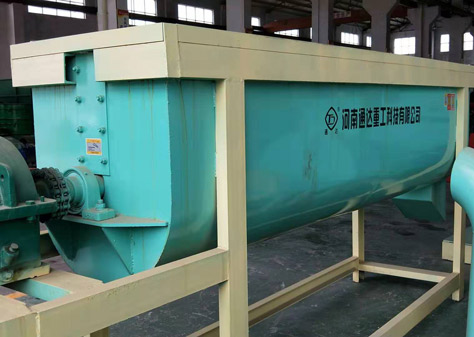Megan Landes-Murphy began Kestrel Ridge Pellet Co. after becoming a shepherd just three years ago.
Wool pellets slowly release nutrients and have water-retention qualities to benefit the soil. Fertilizer Granulator Machine Price

Baa, baa black sheep have you any wool? Yes sir, yes sir, three bags full. One for the master, one for the dame and one for increasing soil health.
A novel fertilizer for gardeners and houseplant enthusiasts alike is hitting the market.
Wool pellets are a renewable, all-natural alternative to synthetic fertilizers. They slowly release nitrogen, potassium and other micronutrients into the soil as they degrade. Plus, they hold three times their weight in water.
The magic lies in the only ingredient included to manufacture these pellets: raw wool.
“Lanolin, the natural oil in sheep’s wool, keeps the perfect moisture content to make the wool into a pellet and retain moisture when they are put in the soil,” said Megan Landes-Murphy, owner of Kestrel Ridge Pellet Co.
Wool pellets are a fairly new discovery. Kestrel Ridge, located near Lawrence in south central Nebraska, is one of 10 wool pellet manufacturers in the U.S. The other companies are spread out in California, Colorado, Wisconsin, Washington, Utah and Vermont.
The only ingredient used to make wool pellets is raw wool, left. The wool is shredded, middle, then run through a pellet machine, right.
Kestrel Ridge is generating demand for an otherwise commonly wasted byproduct of the sheep industry. In Nebraska alone, 245,000 pounds of wool was sheared in 2023, she said. She described wool as a “pain point” for many sheep producers, especially those who raise market lambs. Some are receiving only 2 to 5 cents per pound of wool—if they can sell it.
“Producers are reluctantly burning or burying wool,” she said.
She did not realize selling wool was such an issue until becoming a shepherd herself recently. This is the third lambing season for Megan and her husband, Tom Murphy.
“We are first-generation sheep producers,” said Megan. “We didn’t grow up in agriculture, but it’s a great way of life.”
Sheep graze on the ridges of their pasture outside of Lawrence, Neb.
Tom is an Omaha native, whereas Megan grew up in northern Wisconsin. They met while attending college at the University of Wisconsin-Madison. Megan studied birds to become a wildlife ecologist. They moved to Nebraska after getting married about five years ago when Tom got a job as a sheep researcher at the U.S. Meat Animal Research Center (USMARC) near Clay Center, Nebraska.
When the couple bought an acreage outside of Lawrence in 2021, they finally had room to start their own flock of sheep.
“He always wanted sheep of his own, which is how I got into the love of sheep and the American sheep industry,” said Megan.
Since their acreage was originally fenced for cattle, they had to spend many hours renovating the fences to hold sheep instead. They also added cross-fences to create paddocks for rotational grazing. By incorporating sheep into their soil health plan, the couple is trying to revitalize their 12-acre property and bring back the native prairie.
They chose to raise Shropshire sheep for their meat production qualities. However, the wool from Shropshire sheep is coarse, too itchy to be turned into clothing or yarn.
“After our first shearing, we were left with all this wool and didn’t know what to do with it,” Megan said.
They researched possibilities for converting this underutilized byproduct into something functional.
Megan Landes-Murphy filters raw wool through the shredder, a machine she helped design specifically for shredding wool.
Megan found a study from the University of Vermont that compared wool pellets to another traditional organic fertilizers. Wool pellets provide nutrients to sustain plant growth, just like fertilizers. Yet they also have water-retention properties.
“It seemed like a viable alternative,” she said.
Wool pellets are also a sustainable option, which greatly appealed to Megan as a wildlife ecologist. When she began producing wool pellets, her goal was to be as eco-friendly as possible. She opted for compostable packaging. Moreover, all of her wool is sourced within a 200-mile radius to reduce the carbon footprint associated with transportation.
Megan and Tom’s sheep flock of 25 ewes and seven rams does not produce enough wool to keep up with demand for wool pellets, so a local sheep-shearing crew in Lawrence supplies an additional 30,000 pounds of wool to Kestrel Ridge Pellet Co. Considered second-rate, this wool would otherwise be wasted.
“We want to support the local, rural economy. Shipping wool in from all over the country defeats the purpose of sustainability,” said Megan. “We try to help local producers.”
Wool pellets provide a market for course wool that might otherwise be wasted.
Her company name also carries a local vibe. Kestrel is a bird species that calls the Great Plains home. Megan has always admired the kestrel for its grit and resilience.
“The kestrel overwinters in the Great Plains, so they have to be strong in the unpredictability of Nebraska winters,” she said. “They are small but mighty, like my company and sheep flock.”
The Kestrel Ridge name combines her background in ornithology with her newfound love for her sheep ranch, tucked in the ridged landscape of south central Nebraska.
Producing the wool pellets is a simple, two-step process. The wool is taken straight from the sheep and run through a shredder that was specially invented to sever the long fibers into more manageable pieces. No such machine existed in the U.S. for wool until Megan and a group of other wool pellet manufacturing producers approached Buskirk Engineering in Indiana to design one for this purpose.
Shredded wool can easily be run through the pellet machine.
“We were hand-plucking the fleece apart—that was a lot of labor. The shredder has made production more efficient,” Megan said.
The smaller bits of wool can then be run easily through a pellet mill, the same type that makes wood pellets for meat smokers. The roller and die plate mechanisms compress the wool through tiny holes to pressurize it into pellets.
Megan then separates the pellets by grade, or tightness, to ensure each bag of wool pellets is homogenous. A 1-pound bag costs $15, a 3-pound bag costs $30 and a 10-pound costs $70. The bulk price for 15 pounds or more is $5 per pound, plus shipping.
Kestrel Ridge wool pellets are available for purchase online. Megan is also excited to be attending five vendor markets this spring in Nebraska.
Spring is the perfect time to apply wool pellets so the soil can benefit throughout the entire growing season. For optimum results, apply pellets at a rate of 2-5% of the soil volume. This equates to a half cup per gallon for potted plants or 1 pound per 10 square feet in a garden.
Wool pellets should be worked into the soil to fully support the plant roots. They will expand they get wet, increasing aeration and porosity of the soil over time.
Gardeners can also take advantage of the natural insect-repelling properties of wool.
“They make a great slug repellent when mulched around the leafy greens those bugs love,” Megan said.
Wool pellets can also be mixed with seed starter medium. They not only help retain moisture but also slowly release nutrients to boost seedlings in the early stages of growth.
Those who use wool pellets have seen great results. Katie Jantzen, owner of West End Farm near Beatrice, Nebraska, was part of a pilot program with Kestrel Ridge Pellet Co. last year. She reported 1 inch larger heads of broccoli and 34 pounds more potatoes from the plots containing wool pellets than from control areas.
Kestrel Ridge Pellet Co. is turning thousands of pounds of discarded wool from sheep producers in Nebraska into an effective fertilizer for gardeners across the U.S. Next time you recite the beloved nursery rhyme, sing cheerfully knowing that every sheep now has a market for its wool and is part of a healthy food system.
To purchase wool pellets, go to krpelletco.com.
Kestrel Ridge Pellet Company is offering an exclusive 15% off discount to the Midwest Messenger readers. Enter discount code MIDWEST15 at the checkout to redeem the offer.
Look for Kestrel Ridge Pellet Co. at these upcoming markets:
Reporter Kristen Sindelar has loved agriculture her entire life, coming from a diversified farm with three generations working side-by-side in northeastern Nebraska. Reach her at Kristen.Sindelar@midwestmessenger.com.
Get local news delivered to your inbox!
Email notifications are only sent once a day, and only if there are new matching items.
Will Corman and his wife Brenda are big-picture thinkers and want to make a difference in the industry and their community. Sharing his experi…
No matter the time of year, each growing season presents new challenges that conjure one question after the next. The answers are not always e…
In the spirit of entrepreneurship, two former Nebraska state FFA officers are living their dream, running a bakery, cafe and catering events i…
Instead of selling to the highest bidder, owners can sell or transfer their land to an exchange fund while keeping ties to the family farm.
Megan Landes-Murphy began Kestrel Ridge Pellet Co. after becoming a shepherd just three years ago.
Wool pellets slowly release nutrients and have water-retention qualities to benefit the soil.
Sheep graze on the ridges of their pasture outside of Lawrence, Neb.
The only ingredient used to make wool pellets is raw wool, left. The wool is shredded, middle, then run through a pellet machine, right.
Megan Landes-Murphy filters raw wool through the shredder, a machine she helped design specifically for shredding wool.
Shredded wool can easily be run through the pellet machine.
Wool pellets provide a market for course wool that might otherwise be wasted.
Get up-to-the-minute news sent straight to your device.
Account processing issue - the email address may already exist
Your account has been registered, and you are now logged in.
Check your email for details.
Invalid password or account does not exist
Submitting this form below will send a message to your email with a link to change your password.
An email message containing instructions on how to reset your password has been sent to the email address listed on your account.
Secure transaction. Secure transaction. Cancel anytime.
Your gift purchase was successful! Your purchase was successful, and you are now logged in.

Fertilizer Crusher Machine A receipt was sent to your email.
